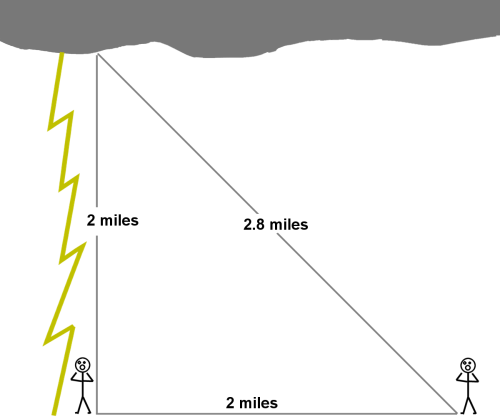I was lying in bed a couple of nights ago when a thunderstorm came through. I heard the far-off rumbles of thunder, lasting a few seconds each, until one lightning bolt struck within a few hundred feet with a huge boom! The loud rumble went on and on, at least 10 seconds before it quickly faded away.
It started me wondering, there in the pre-dawn hours, why the rumble lasted so long for that strike. It wasn’t an echo; there was nothing nearby to echo from. It wasn’t that it just seemed to fade more slowly just because it started louder — the end of the rumble was still quite loud and I’m sure if I had been further away I would have still heard it. And it died off pretty quickly; it wasn’t just a fade away. Why 10 seconds or more, when more distant thunder lasts just a few seconds?
And then I had the following thoughts, illustrated below. A lightning strike is almost instantaneous, super-heating the air near the cloud and near the ground at almost the same instant. This super heating is what causes thunder as the expanded air sends out a tidal wave of sound. At the ground, I heard the sound emitted from the bottom of the strike within a second or less, as I was quite close. But the top was maybe a couple of miles up, at 10,000 feet or more. Sound travels around 1000 feet/second, so in the first second sound from the bottom 1000 feet arrived, during the second second sound arrived from the second 1000 feet, etc., so that finally it took 10 seconds for the sound from the top to reach me. All during this time I was hearing a continual rumbling as sound from an ever higher portion of the strike reached my location.

Now what would someone have heard who was about 2 miles away from me? The bottom of the strike would be 2 miles away, so it would take about 10 seconds for the first sound to reach him. By the Pythagorean theorem, the top would be about 2.8 miles away, so that would take about 14 seconds to reach. For this observer, the thunder would only have lasted about 4 seconds. For someone further away, the duration would be even less (4 miles away would be about 2.5 seconds, for example).
So I think that explains why the rumble from thunder lasts much longer when the strike is close.
It reminds me a little of the theory of relativity, where simultaneity and duration are different for differently moving frames of reference. In this case, the event is interpreted as having different duration for different observers. Of course the underlying theories are quite different, but it still strikes me as an interesting parallel.

3 responses so far ↓
1 Don // Dec 19, 2017 at 12:19 pm
Very interesting. I had never thought about that before but it makes perfect sense.
And your illustration is very professional!
2 R // Dec 19, 2017 at 1:23 pm
Makes perfect sense, and if you’re going to lose sleep over something, this is as good as any reason.
3 Donna // Dec 22, 2017 at 4:59 pm
I’ve heard that long lasting rumble too, but never spent time figuring out why or whether it came from just one strike to the ground, or multiple (coincidental) strikes elsewhere in the atmosphere. Thanks for clearing it up!
Leave a Comment